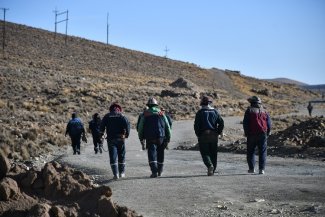
Hideo-san, a traditional hunter, inspects a Matagi knife from the 19th century. It is a hunting weapon that has been in his family for seven generations. The most notable difference with the knives of today is that, back then, the handle was hollow, so that the knife could be fitted on to the end of a stick and be used as a spear.
In the Tōhoku region, to the north of Honshu – the main island of the Japanese archipelago – the Matagi are waging an ongoing battle to ensure their survival and the conservation of their cultural heritage. Since its origins as a distinct subculture, over three centuries ago, this community has been characterised by its very rigorous approach to hunting and great respect for nature. Their exacting way of life is now combined with a disquieting realisation: they lack the new blood needed to carry on the Matagi legacy.
The fact is that the traditional lifestyle of these hunters no longer resonates with the younger generation, and the average age of their active members is forever increasing. In 21st century Japan - modern, highly globalised and industrialised – the prospect of a life in the snow-covered mountains, and the tremendous physical effort involved in making a living as a hunter, no longer has the same appeal.
Hunting, in addition, is increasingly regulated and many of the legal restrictions represent a serious obstacle for young and old alike. Administrative forms struggle to incorporate the boxes that correspond to their traditions and approach to hunting, and the high taxes as well as the strict delimitation of hunting seasons mean that Matagis have to take on other work to be able to survive during the rest of the year.
Traditions under siege
“The laws dictate when they can hunt. So outside the winter months, the Matagi hunters work in farming or as woodcutters,” says Yasuhiro Tanaka, a photographer and expert on this community, who has lived and worked alongside them for more than three decades. Many are forced to migrate to urban areas, explains Tanaka, who has written a series of books on the diverse features of this group of hunters. “Nowadays, the Matagis cannot live off hunting alone. It’s impossible,” he says.
For a community that has been hunting as a means of subsistence for centuries, the unfathomable web of rules and regulations they now have to deal with is a real problem.
According to the Law on Hunting and the Protection of Wildlife, they have to apply for a licence from the governor of the prefecture in which they reside, pass an exam, and pay the registration fee and the corresponding hunting tax. The licence costs around 19,000 yen (around €141 or US$170), it is only valid for hunting in that specific prefecture and has to be renewed every three years, after passing another aptitude test. They are also required to take out insurance covering hunting accidents. And, of course, a weapon is needed for hunting, so a licence has to be requested from the National Public Safety Commission. That is another tedious process, and not a cheap one either.
“When I was 15 and I went out with the hunters for the first time, I was not holding a weapon. My job was to act as a scout – a crucial role, which the Matagis call sekkou, to sight the prey, and to act as a kind of decoy,” explains Hideo Suzuki, the leader of the remote hamlet of Animatagi. His community, located in the prefecture of Akita, is known among locals as “the (original) home of the Matagi”.
“The new laws do not allow us to hunt without licences. Many people have been affected and excluded, because without the necessary permits you cannot take part in a Matagi hunt, you are not legally authorised to go up the mountain with us, regardless of your role.”
According to recent data published by the Japanese Environment Ministry, the number of hunting licence holders has decreased across the country over the last four decades: whilst in 1975 there were 518,000, in 2014 the number had fallen to 194,000. In the case of the Matagi, the numbers speak volumes: the hunters aged over 60 amounted to 9 per cent of the total four decades ago; now they make up 66.5 per cent.
In 2016, anthropologist Scott Schnell organised a conference at the University of Iowa, USA, to discuss the matter and to address the struggle of hunter cultures like the Matagi – caught between two eras – to keep their legacy alive. Two members of the community were invited to speak about their culture. They emphasised that the Matagis – who share many similarities and parallels with native American hunters – play a fundamental role in Japanese society, not only as protectors of local ecosystems but also as advocates of healthy coexistence between rural and urban life, working in continual communion and harmony with nature.
The Matagis, unlike most modern hunters, do not view hunting as a sport or recreational activity. For them, the nature that surrounds them has consciousness; it offers them protection and sustenance but, in return, they must act responsibly and with moderation.
They believe they can hunt because the Deity of the Mountains (Yama-no-Kami) allows it, so when they enter her sacred land they are guided by a sense of utmost reverence for the natural balance. They take no more than what they need to survive, hunting for their own consumption or regulated sale, or to protect rural and agricultural settlements from the ravages of wild animals.
They have, of course, evolved in many respects. They use modern-day firearms and clothes, for example, but the Matagis continue to hold firmly on to the mystical beliefs inherited from their elders. Keeping their memory alive is a considerable feat, given how little written knowledge there is about the culture.
“I don’t really know much about the origins of Matagi culture. All I know is that it dates back more than 300 years,” says Suzuki. As other leaders and veteran members of this community explain, everything they know about their customs has been learnt through oral tradition, passed on to them by their elders.
“It is essential that we entrust our future to the younger generations, by teaching our values to them,” says Suzuki. The leader nevertheless acknowledges that it “is by no means an easy task”. “Our members will continue to decline if we do not find successors. I am really worried that Matagi culture may disappear,” he concludes.
Today, in the context of ever-increasing awareness and activism, both within Japan and beyond, hunting is widely condemned (as it can no longer really be considered a subsistence activity) and particularly the hunting of animals such as the Japanese black bear – the most primordial and emblematic prey of the Matagi – a species currently classed as vulnerable by the International Union for the Conservation of Nature (IUCN). It is against this background that a Matagi Summit is held once a year in Japan, during which traditional hunters share their experiences, beliefs and lifestyle, in a bid to remove the stigma attached to them and, if possible, to attract new members.









